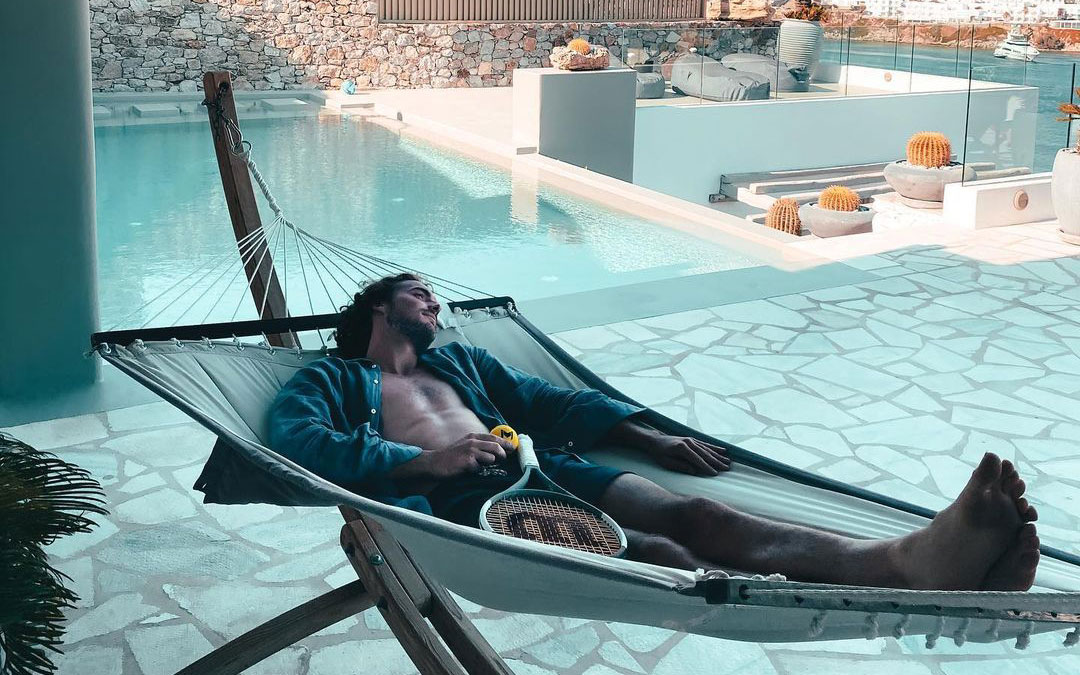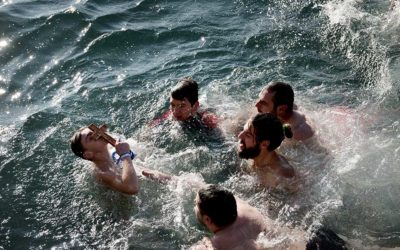In an exclusive interview, the Greek tennis phenomenon speaks openly about the Roland Garros final, other tennis greats and what it will take to dethrone them.
My first contact with Stefanos Tsitsipas took place three years ago, again after a Roland Garros tournament. Nineteen years old at the time, he had recently climbed to the top 40 in the tennis rankings and achieved his first victory in the main court of a grand slam, before being beaten by future finalist Dominic Thiem. We met at the Vouliagmeni Tennis Club for “Lunch with ‘K’.” His father and coach, Apostolos, was encouraging him to eat something for the purposes of the interview, but to no avail.
This time we connected virtually. I was fortunate enough to witness his triumph in the semi-final against Alexander Zverev in person, as well as his tough loss in the final against Novak Djokovic. But I had to return to Brussels immediately. He was scheduled to travel to Halle in Germany, one of the two basic preparatory tournaments for Wimbledon. However, he withdrew from this tournament due to the death of his grandmother – Apostolos’ mother – an event he was informed of before his match against the Serbian champion.
View this post on Instagram
In this exclusive interview he gave me for “K” Magazine, he spoke openly about the final, the tennis greats and what it will take to dethrone them, about his exceptional appearance in Paris and the impressive rise of Greek tennis – as well as about his father, his grandmother and the new life approach professional sports gave him during the pandemic.
In his victory speech Djokovic tried to console his inconsolable opponent, saying that it is defeat that teaches players more lessons. So I began by asking the Greek champion, ranked 4th best tennis player in the world, what he learned from his first grand slam final.
“I realised that with faith, love and consistency in what I do, this sport in particular, anything is possible,” Tsitsipas says. “I got very close and I learned important things from this experience, that are applicable on the court and even beyond. With the correct attitude, the appropriate morale, all dreams can come true regardless of where you come from or how you have been raised.”
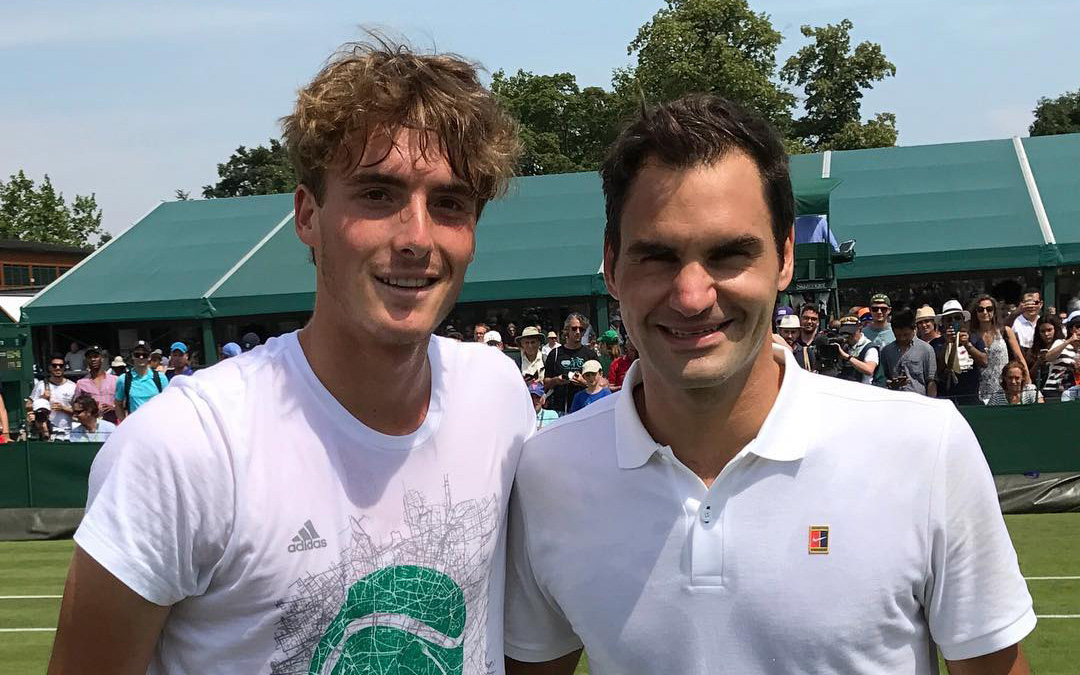
Tsitsipas and Roger Federer in 2017.
© Instagram: @stefanostsitsipas98
Wrestling with legends
That fateful Sunday, having secured a 2-0 set lead, he was a breath away from achieving something no other new generation ATP tennis star has ever achieved: a victory in a grand slam final against one of the three legends (Federer, Nadal, Djokovic) who have monopolized the great tournament titles for almost 20 years. How does he explain the longevity of their domination?
“Those three athletes do everything correctly, so they can stand out from the rest. Meaning training, but also regarding the entirety of their daily routine. The work they do on a daily basis is simply amazing, so that they can be the best. I think I can learn a lot from their example, how they have kept their body in shape to achieve this longevity.”
The Greek champion is widely known as the “second best clay court tennis player in the world” (after 13-time Roland Garros winner Rafa Nadal). This surface is particularly demanding, requires frightening stamina, patience (as the swift completion of points is much harder) and great baseline stability.
The next grand slam, Wimbledon, is the last one that still takes place on a grass court (until the end of the 1970’s three of four grand slam tournaments were still played on grass courts). Even though slightly less so than in the past, a distinction on the courts of the legendary All England Club requires a different type of game. Speed, strong serves and approaching the net is important.
Without a doubt, Tsitsipas possesses all the technical skills to excel on grass – he is considered one of the best players to combine service and drives to score fast points. But how hard will it be adjusting to grass courts after Roland Garros – especially when you have competed in the final there and have limited time left?
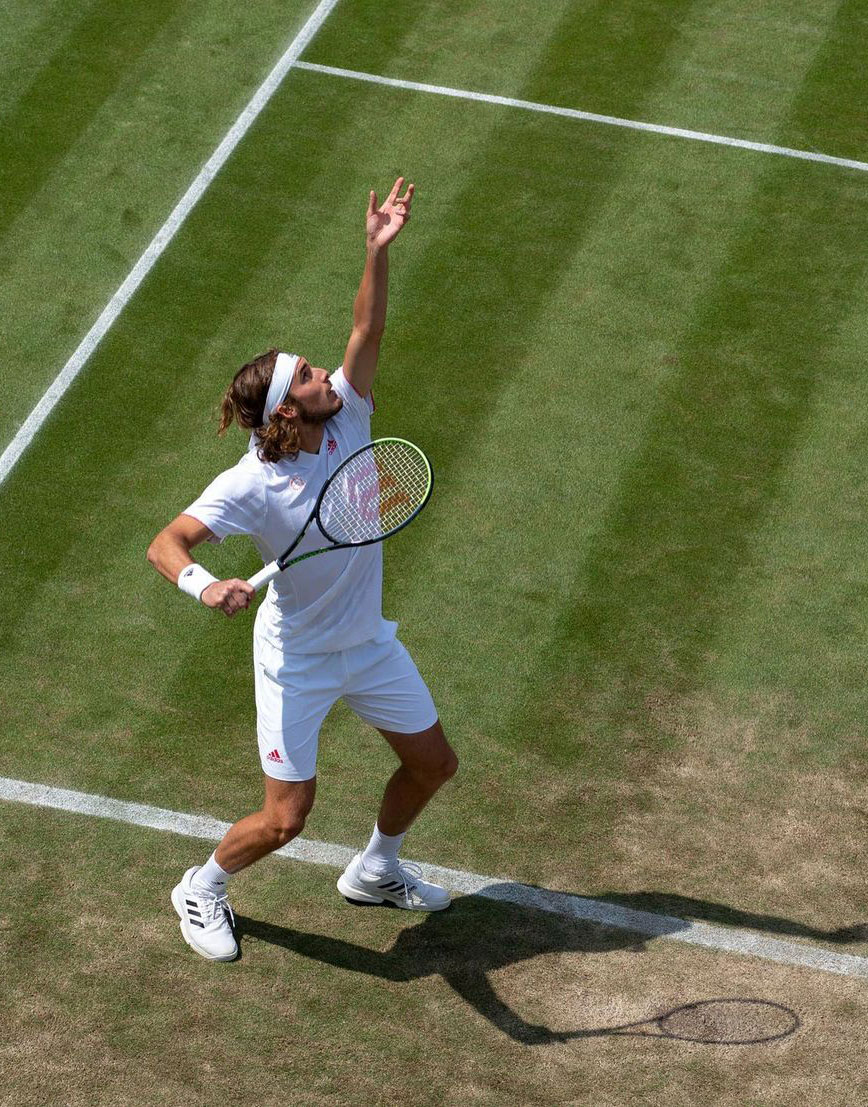
© Instagram: @stefanostsitsipas98
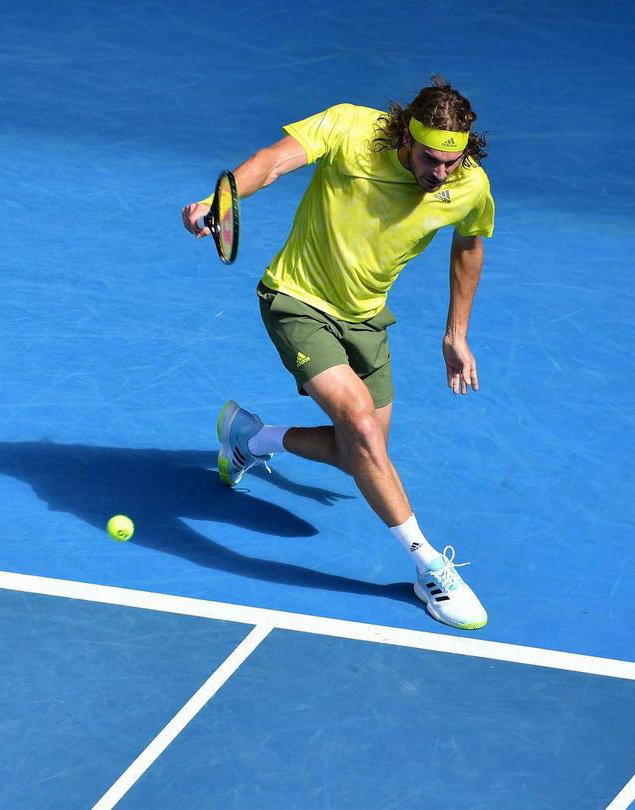
© Instagram: @stefanostsitsipas98
“There is a lot of love about this surface. I will have to quickly adapt to the new demands – and the grass court season is very short. Yet with the appropriate training and preparation, nothing is impossible. [Wimbledon] is a new beginning and you never know how far you will go. Every game is special. I do not think any players think about winning tournaments from so early on. It is important for me to enjoy it. I can make my game more aggressive on grass. I see this as a new challenge, to prove that I can maintain this high level on a completely different surface.”
This year’s Roland Garros had a heavy Greek tint. While Tsitsipas’ great achievement was somewhat expected, Maria Sakkari’s achievement of being one point away from the final was less so. Suddenly, Greek twitter accounts went from discussing pandemic issues to analyzing tennis – and the issue soon got political too! Politicians were bumbling over each other as they sent their congratulations, hoping to catch some rays of light from the Greek tennis stars. In our discussion three years ago, Tsitsipas had already expressed how it pleased him that he and Sakkari would contribute to making the sport more popular in Greece.
“We have the culture”
We return to the topic and I ask him how it feels that Greeks have fallen in love with tennis again – and what can we do to make it a more long-term relationship, so that the next generation of talented athletes are offered infrastructure by the state to help them grow and develop?
“Our country has a great history and culture in athletics. This is where the Olympic Games began. We have not taken advantage of this, even though we have achieved many distinctions in recent years – football, basketball, track and field… We have raised the Greek flag in many athletic competitions. In Greece, tennis was always viewed as a rich person’s sport, not for everyone. I strongly disagree with this image.”
Until recently, he notes, the state had not shown any interest in creating infrastructure to nurture new talents, contrary to Italy, France and Spain. “This is something that is missing, something those in charge should focus on. We need a tennis center that children from all over the country can attend, to develop their talent.” Something like this would make the option of going professional much more “viable.”
After such a difficult decade, he feels that now is the right time for this type of investment: “The crisis a few years ago was a blow to our morale, but was not able to stop us from wanting to achieve something better. This tennis center needs to be created now, so that people with talent are able to develop and grow. Otherwise, only a few will be able to move forward, to achieve anything extraordinary in this field…”

He has played alongside his friend and colleague Maria Sakkari many times. Their successes at this year’s Roland Garros were referred to as the “rise of Team Greece” by international media.
© Instagram: @stefanostsitsipas98
Tsitsipas also notes that Greece has a greater tradition in team sports, rather than individual sports, but he thinks that this is “gradually changing.” Tennis, he says, “could become one of the most popular sports in Greece. It is a wonderful sport that gives athletes the ability to express themselves, to play it in their own way, to showcase their personality. There is something magical about it.”
Tennis in the time of the pandemic
Professional tennis was put on hold for five months last year due to the pandemic. When games resumed again in August, they were often without spectators. The organizers at Roland Garros decided to allow spectators at 35% capacity – and a 23:00 curfew. On the evening of June 11, at 22:30, the epic third set of the second semi final between Djokovic and Nadal had just finished. Yet as we headed towards the exit, disappointed that we would not be watching this match of titans until the end, we heard the crowd explode into cheer. “They spoke with the authorities and they gave them permission,” one of the pursors told us. The prime minister of France, as we found out later, was watching the game and personally called to allow this extension.
This last minute decision is indicative of the uncertainty – a product of the fear we have experienced the past eight months of this bleak winter – that inevitably accompanies the return to normality. To get to Roland Garros on Friday I had to take a test to travel to Paris and a rapid test to be allowed into the stadium (and one more in between to attend the NATO meeting in Brussels on the day of my return).
In fact I had to calculate the timing of my tests, so that I would not need to take another rapid test before the final on Sunday (the organizers required that tests be taken less than 48 hours before). Even with limited numbers of spectators, the vibe during the semi finals and the final was exceptionally intense. The suppressed energy of the past few months of lockdown burst out, electrifying the atmosphere.
“I am grateful”
I asked Tsitsipas about his experience during the last 12 months – how was it to play in an empty court, and how did it feel to hear his name being chanted once again, even by ⅓ of the spectators in the Philippe Chartier court. “The spectators made all the difference”, he says. “They created the atmosphere that made the final so special. I am grateful for their energy, love and support. It is something I have missed terribly. It is this energy that gives life to tennis, it fills our souls. The love of the crowds is a reward for all our hard work.”
In his speech after the defeat on Sunday, Tsitsipas’ voice was barely audible. But listening to the comforting words and praise from Djokovic and the entire court echoing his name, perhaps he felt – even fleetingly – the first traces of a restored thirst. Perhaps he remembered that, after these magical two weeks for him and for Greek tennis, only good days could await. Perhaps he let himself think of the final Sunday of the next Roland Garros, with Chartier at full capacity, with the old guard finally bowing down, with the nightmare of the pandemic finally a memory.
View this post on Instagram
“I miss my grandmother”
The young tennis player speaks about the loss of his grandmother, which gave another color to an already emotionally heavy day. “It was a tough moment,” he says. “I loved her very much, as she loved me. Unfortunately, due to my commitments abroad, I did not see her as often as I would have liked.
She was a woman who had great faith in life and a lot of love for people around her. She did amazing things for our family, she put all her energy into it. She raised four children, including my father, who is an exceptional person, who in turn has helped me so much on my journey. I think I owe this to her. To the way she raised him, for teaching him the basics about life, which he then passed on to me. I already miss her very much.”
He talks about his relationship with his father, who quit being a tennis teacher when Stefanos was 11 years old to become his coach, accompanying him to tournaments around the world. “I need him by my side. He is my best friend, the person who will always be there for me. There is only love between us. He is someone who will support me regardless of the result.”
His roles as coach and father are discreet, he explains. “I know what his role and job is in the court. I have chosen him for this. I want him near me, for the good and the bad times that will come. Every week is a life lesson for us – and we are fortunate to experience this together through tennis. It fulfills us.” The fact that he has both his parents – his mother Julia Salnikova was also an international tennis talent as a teenager in the Soviet Union – by his side during games is the “best gift of life.”
His life’s landmarks
1998
Born in Athens
2004
Begins lessons at the Glyfada Tennis Club with Giorgos Fountoukos.
2009
Wins his first juniors tournament in Normandy.
2016
Ranks as No. 1 junior and begins his professional career.
2017
First Greek player to be ranked in the top 100 of the ATP Tour rankings.
2018
April: Reaches his first final in an ATP 500 Series tournament, in Barcelona (clay), where he is defeated by Rafael Nadal.
August: During the week of his 20th birthday he knocks out four top 10 players, including Novak Djokovic, to reach his first Masters 1000 final, in Toronto. He loses to Nadal again.
October: He wins his first professional tournament, the Stockholm Open. He ends the year ranked No. 15 in the ATP Rankings.
2019
January: Reaches his first grand slam semi final, in Australia, counting wins against Roger Federer among others.
November: Triumphs at Nitto ATP Finals, in which the top eight players of the year are participating. His third title of the year finds him No. 6 in the ATP Rankings.
2020
During this rather meagre pandemic year he earns one more title (Marseille Open, ATP Tour 250 Series) and reaches his second grand slam semi final at Roland Garros (where he lost with five sets to Djokovic).
2021
January: Achieves epic comeback (down 0-2 sets) against Nadal in the semi finals of the Australian Open.
April: Wins his first ATP Masters 1000 trophy in Monte Carlo. In May, he also wins the 250 in Lyon.
June: With his course to the finals in Paris, he reaches No. 4 in the ATP Rankings – his highest position to date.
This article was previously published in Greek by at kathimerini.gr.

